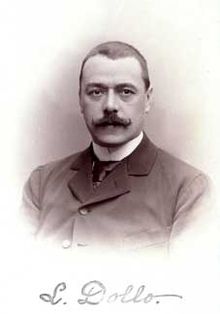Louis Dollo
| Louis Dollo | |
|---|---|

Louis Dollo
|
|
| Born | 7 December 1857 Lille |
| Died | 19 April 1931 (aged 73) Brussels |
| Citizenship | French |
| Nationality | Belgian |
| Fields | palaeontology |
| Known for | Dollo's law |
| Notable awards | Murchison Medal (1912) |
Louis Antoine Marie Joseph Dollo (Lille, 7 December 1857 – Brussels, 19 April 1931) was a French-born Belgian palaeontologist, known for his work on dinosaurs. He also posited that evolution is not reversible, known as Dollo's law. Together with the Austrian Othenio Abel, Dollo established the principles of paleobiology.
Louis Dollo was born in Lille, Nord-Pas-de-Calais, a scion of an old Breton family. He studied at the École Centrale de Lille, with the geologist Jules Gosselet and the zoologist Alfred Giard, both of whom influenced the young Dollo. In 1877, he graduated with a degree in engineering. After his graduation he worked in the mining industry for five years, but simultaneously developed a passion for paleontology. In 1879, he moved to Brussels.
For three years, starting in 1878, he supervised the excavation of the famous, multiple Iguanodon find at Bernissart, Belgium. He devoted himself to their study as a scientific passion, initially concurrently with his engineering career. In 1882 he became an assistant naturalist at the Royal Belgian Institute of Natural Sciences. Dollo was given membership in the Société des sciences de Lille and the Geological Society of London.
From 1882 to 1885, while he was head of the vertebrate fossil section of the Royal Institute, Dollo worked on reconstructing the skeletons of the Iguanodons, as it was necessary to display them on their hind legs. The first one was assembled in the interior of an unused church that Dollo was using as a workshop. Twelve of those skeletons have been the principal attraction of the Museum of Natural Sciences at the Royal Institute. Dollo collaborated with his former professor Alfred Giard and the Université Lille Nord de France.
...
Wikipedia
